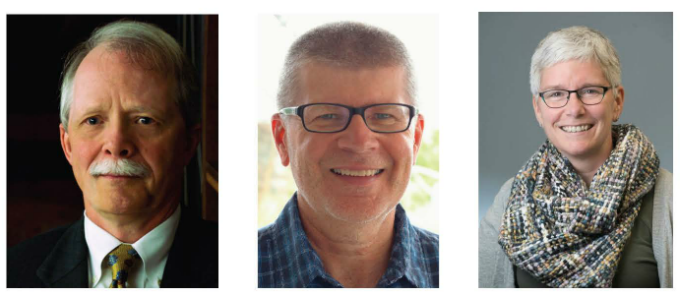Immunology Training Grant
The Immunology Training Grant (2T32AI007313) is an NIH-NIAID sponsored (T32) training program. Funded since 1989, the T32 provides support for outstanding predoctorial trainees to do impactful basic and translational research in Immunology at the University of Minnesota.

Former Directors: Tucker LeBien & Marc Jenkins
Current Director: Kristin Hogquist
History
At the inception, the grant was under the directorship of Dr. Tucker LeBien. The T32 grant played a key role in the development of the first University of Minnesota graduate program to feature Immunology and to help recruit several new Immunologists which led to the establishment of the multi-departmental Center for Immunology (CFI). With the establishment of the CFI, the coordination of Immunology research and educational activities was housed in one location, fostering a true collaborative environment. After the CFI was established Dr. LeBien transferred the directorship of the T32 Training Grant to Dr. Marc Jenkins, who at the time was the co-director of CFI. Dr. Jenkins continued to successfully foster the grant for over 16 years. In 2012 Dr. Jenkins passed the directorship of the T32 grant to the current CFI co-director, Dr. Kristin Hogquist. During its long history, the T32 grant has served as a solid and consistent base of support for the highest quality graduate students studying Immunology.
Preceptors
The T32 Training Grant program has been designed to provide pre-doctoral students with the intellectual and technical skills needed to become highly productive, creative and independent scientists. To promote the development of these skills, the students are mentored by an outstanding Immunology faculty member. The preceptors involved in this grant not only have an enthusiam for mentoring but represent a broad range of research areas in Immunology. The T32 Training Grant is supported by 22 highly productive research preceptors that represent 8 different departments in the Medical School. Some of the research interests include: Autoimmunity, Signal Transduction, Transplantation, Tumor Immunology, Mutation and Carcinogenesis, T cell Development, Cell Trafficking, Immunologic Tolerance and T cell Migration.
Faculty preceptors for graduate training in immunology
- Matthew Aliota|Veterinary and Biomedical Sciences
Research Interest: Arbovirus evolution and transmission dynamic; pathogenesis - Bryce Binstadt | Pediatrics
Research Interest: Autoimmunity, Innate immunity - Bruce Blazar | Pediatrics
Research Interest: Immunobiology of transplantation - Tyler Bold| Medicine
Research Interest: Adaptive immune system combats infection with Mycobacterium tuberculosis - Christina Camell |Biochemistry, Molecular Biology and Biophysics
Research Interest: Inflammaging - Michael Farrar | Laboratory Medicine & Pathology
Research Interest: Lymphocyte signal transduction and development - Brian Fife | Medicine
Research Interest: Autoimmunity, tumor immunology, immunological tolerance, intravital 2 photon imaging - Tanya Freedman | Pharmacology
Research Interest: Regulation of membrane-proximal signaling in hematopoietic cells, macrophage response due to inflammation - Steven Friedenberg | Veterinary Clinical Sciences
Research Interest: Canine autoimmune diseases - Thomas Griffith | Urology
Research Interest: TRAIL as a cancer therapeutic and the ability of apoptotic cells to influence the immune response - Sara Hamilton Hart| Laboratory Medicine & Pathology
Research Interest: CD8 T cell pathogen protection mechanisms - Geoffrey Hart| Medicine
Research Interest: NK cells in infectious disease - Kristin Hogquist | Laboratory Medicine & Pathology
Research Interest: T lymphocyte development and selection - Stephen Jameson | Laboratory Medicine & Pathology
Research Interest: T cell homeostasis, differentiation, trafficking and memory - Marc Jenkins | Microbiology and Immunology
Research Interest: Helper T lymphocyte biology - Nichole Klatt | Surgery
Research Interest: Microbiome and mucosal dysfunction - Ryan Langlois| Microbiology and Immunology
Research Interest: Influenza innate immunity - Michael Lipscomb| Pharmacology
Research Interest: Dendritic cell differentiation - David Masopust | Microbiology and Immunology
Research Interest: T cell migration, differentiation, and memory in infection - Jeffrey Miller | Medicine
Research Interest: Natural killer cell development and cancer - Branden Moriarity | Pediatrics
Research Interest: Pediatric cancer genetics, Gene-editing, Immunotherapy - Daniel Mueller | Medicine
Research Interest: T cell tolerance and anergy - Laura Niedernhofer| Biochemistry, Molecular Biology and Biophysics
Research Interest: Immune cells in aging - Xavier Revelo | Integrative Biology and Physiology
Research Interest: Immune cells in liver pathology - Kaylee Schwertfeger | Laboratory Medicine & Pathology
Research Interest: Breast cancer cells interaction and microenvironments - Pamela Skinner | Veterinary and Biomedical Sciences
Research Interest: HIV pathogenesis - Ingunn Stromnes | Microbiology and Immunology
Research Interest: T cell therapy for pancreatic cancer - Vaiva Vezys | Microbiology and Immunology
Research Interest: T cell responses in autoimmunity and chronic infections - Jesse Williams| Integrative Biology and Physiology
Research Interest: Macrophages in cardiovascular disease
Application Information
Each year the training grant supports up to 6 pre-doctoral students. A student can remain on the training grant for up to two years. During the time of the fellowship the student is provided with a stipend, tuition, travel and equipment support.
Fellowships are awarded annually based on a competitive process which is decided on by a faculty vote. Applications are solicited by invitation only, typically in June. To be eligible for consideration pre-doctoral students must meet the following criteria:
- Must be a U.S. citizen or permanent resident.
- Thesis research must be done in 1 of 22 faculty preceptors laboratories.
- The student must have completed (or be on track to complete their preliminary exam in the current season), but must have at least 12 months remaining towards completion of their PhD.
- Thesis research must be focused on an Immunological problem.
- Student must agree to fulfill training requirements: MICA8003, MICA8011, participation in RCR training, attending and presenting at Immunology data and journal clubs, attend and present a poster at Immunology retreat.
- The student will also agree to submit yearly progress reports, ensure that publications are deposited in Pub Med Central, prepare an IDP, and participate in an exit review.
For more information, contact Vaiva Vezys at vvezys@umn.edu